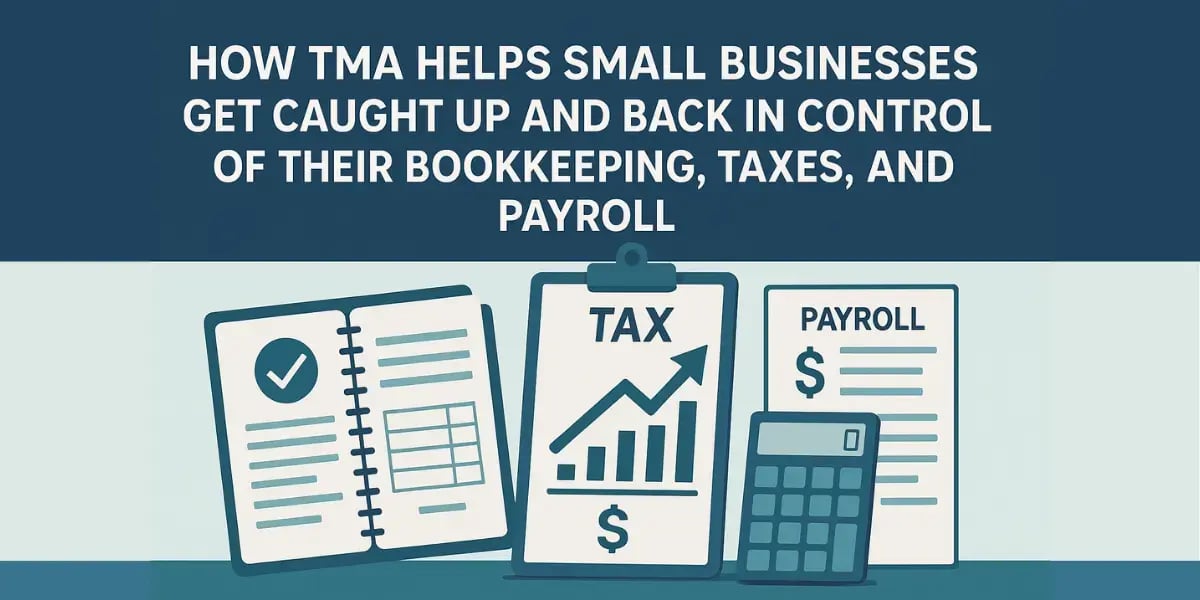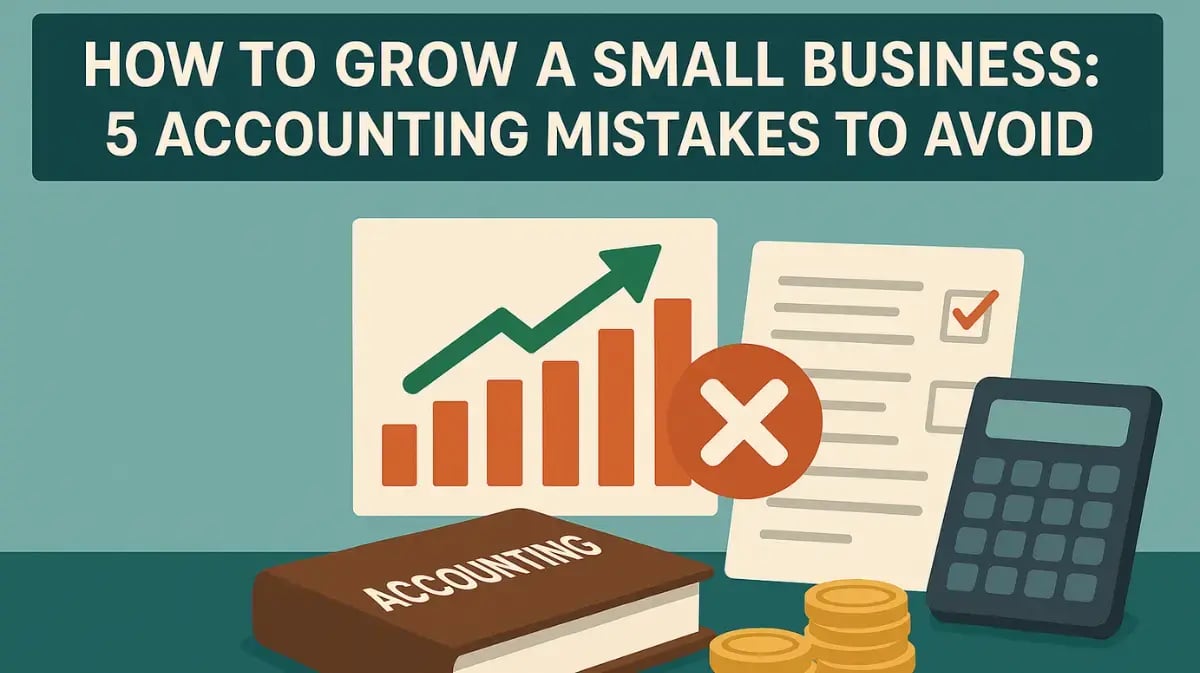Should You Hire In-House or Outsource Your Accounting?
May 17th, 2025
6 min read

Running a small business means wearing a lot of hats—sales, operations, customer service, and yes, accounting. But let’s be honest: accounting isn’t just about keeping track of expenses and sending invoices anymore. As your business grows, your financial picture gets more complicated. You’re dealing with payroll, taxes, cash flow, compliance requirements, and strategic planning—all of which demand time and expertise.
At some point, every business owner asks the same question: Should I hire someone internally to manage this, or is it smarter to outsource?
This decision isn’t just about money. It impacts how you use your time, the kind of talent you rely on, and how confident you feel in your numbers. It's also about whether you're spending more time worrying about spreadsheets and tax filings than actually growing and running your business.
Below, we’ll walk you through a comparison of hiring in-house vs. outsourced accounting, show you what to consider based on your business’s size and complexity, and help you move forward with clarity and confidence.
What Does an Accountant Actually Do?
Let’s clear up a common myth: Accounting is more than just tracking expenses or filing taxes once a year. If that’s all you’re getting, you’re missing out on some serious value. A great accountant is more like a financial resource—someone who helps keep your business running smoothly today while helping you plan for tomorrow.
Here’s what an experienced accountant can bring to the table:
- Day-to-Day Bookkeeping: Keeping your financial records organized and up to date, so you always know where your money is going—and where it's coming from.
- Payroll Processing: Making sure your team gets paid on time, taxes are withheld properly, and you stay in compliance with state and federal rules.
- Financial Reporting and Budgeting: Turning your raw numbers into meaningful reports showing how your business is performing—and where you can improve.
- Tax Preparation and Strategy: Filing returns is just the beginning. A good accountant helps you proactively plan for tax season, minimize liabilities, and avoid surprises.
In short, good accounting isn’t just about staying out of trouble. It’s about understanding your numbers, spotting trends, and using data to make confident decisions that grow your business.
The Case for In-House Accounting
Hiring someone to work directly in your business can seem like the natural choice as your operation grows. Here’s a closer look at what you gain and what to watch out for with an in-house accounting hire.
Pros: Why In-House Might Be the Right Fit
If you value having someone on-site who knows your business inside and out, in-house accounting can offer a strong sense of continuity and control. Here are some of the key advantages:
- Immediate Access: Need quick answers or real-time updates? Your team member is right down the hall.
- More Control: You can set the processes, choose the software, and build a workflow that fits your business.
- Company Familiarity: In-house staff understand the ins and outs of your business culture, goals, and customers.
Cons: Challenges That Come with In-House Hires
Of course, hiring in-house also comes with significant commitments—from cost to capacity to hiring headaches. Here’s what to consider before you bring accounting in-house:
- High Costs: Hiring full-time comes with a salary, benefits, payroll taxes, office space, equipment, and ongoing training.
- Hard to Find Talent: The right candidate with the right mix of skills might be hard to find—and even harder to keep.
- Limited Expertise: A single accountant might be great at bookkeeping but not tax strategy, or vice versa. That can leave gaps in support.
Hiring in-house may make sense if your business is large enough to keep someone fully occupied and your operations are complex enough to justify the cost.
Still, it’s important to consider how fast your business is growing and whether you want to invest in managing employees long-term. Recruiting, onboarding, and supervising in-house accounting staff can take up valuable time that you may not have as a business owner.
The Case for Outsourced Accounting
On the other hand, many small and growing businesses choose to outsource their accounting needs. It can be a flexible, expert-led solution without the overhead and complexity of managing internal staff. Whether you’re looking to save time, reduce costs, or tap into a wider range of expertise, outsourcing offers some compelling benefits.
Pros: Why Outsourcing Works for Growing Businesses
Outsourcing gives you access to a full financial team, without having to hire, train, or manage anyone in-house. It’s a smart option for business owners who want peace of mind, predictable pricing, and the ability to focus on what they do best.
Here’s what makes outsourcing attractive:
- Cost-Effective: You pay for what you need—and nothing more. This is especially helpful for growing businesses with changing needs.
- Built-In Expertise: A good firm gives you access to a whole team of specialists: bookkeepers, payroll pros, tax advisors, and business consultants.
- Scalable Services: As your business grows, an outsourced firm can grow with you. No need to hire or train new staff.
Cons: Considerations Before You Outsource
Of course, outsourcing isn’t perfect for every situation. It’s important to understand how the relationship works and what level of access and service you’ll need.
Here are a few things to think about:
- Less Face Time: You won’t see your accountant in the office daily.
- Requires Communication: You’ll need a point person to relay key business updates and coordinate with the firm.
- Not Always Right for Daily Needs: If you require someone on-site every day for bill pay or handling cash, outsourcing may not fully replace an employee.
Outsourcing makes a lot of sense for businesses that want expert help without the cost or hassle of managing accounting staff.
It also creates a layer of separation that can be helpful—an external team often brings a fresh perspective and may identify opportunities or risks an internal team could overlook. Plus, with the right tools and cloud-based systems, communication can be seamless.
Cost Comparison: In-House vs. Outsourced Accounting
Let’s talk money.
Hiring a full-time accountant comes with a sizable investment. Salaries alone often range from $50,000 to over $100,000 annually, depending on the role, experience level, and location. But that's just the beginning. Add in benefits like healthcare and retirement contributions, which can run $8,000 to $15,000 or more each year. Then, include payroll taxes, office space, technology, accounting software, and the cost of ongoing training. Altogether, the total cost of hiring and maintaining an in-house accountant can quickly balloon.
By comparison, outsourcing your accounting is typically much more affordable and scalable. Most small businesses pay between $1,000 and $3,000 per month for outsourced services, depending on the complexity of their needs. That comes out to roughly $12,000 to $36,000 annually, often less than half the cost of an internal hire.
Even more compelling is what you get for that cost: not just one person but a team of specialists. Bookkeeping, payroll, tax planning, and financial reporting are all covered. You also avoid the downtime risks associated with employee sick days, vacation, or turnover.
When you factor in time savings, risk reduction, and access to better expertise, outsourcing becomes an even more attractive option for small business owners trying to manage costs while gaining reliable financial insight.
If you’re not quite ready to commit to hiring a full-time team member or don’t have the budget, outsourcing provides flexibility and peace of mind.
Which Option Is Best for Your Business?
There’s no one-size-fits-all answer, but here are some general guidelines:
- Small, service-based business (<10 employees): Outsourcing is usually more cost-effective and less stressful.
- Rapidly growing or multi-location business: Consider a hybrid model or outsourced controller/CFO services.
- Need daily, hands-on accounting (like retail cash handling): In-house might be worth the investment.
- Have complex payroll, inventory, or compliance requirements? An outsourced team can bring the depth you need.
Also, consider your comfort level with delegating. Some business owners like having their team under one roof, while others prefer the convenience of handing off back-office tasks to a reliable external provider.
When choosing a path, ask yourself:
- Do I want to manage and train someone internally?
- How important is immediate, in-person access?
- Do I need advanced tax, financial strategy, or payroll expertise?
- Is my business stable enough for a full-time hire, or am I still scaling?
Your answers can guide you to the right fit.
Choose the Path That Moves You Forward
Hiring in-house or outsourcing your accounting isn’t just a budget decision—it’s about setting up your business for long-term success. The right solution gives you clarity, saves time, and helps you focus on what you do best.
Whether you choose to hire in-house or outsource with a trusted accounting firm, the goal is the same: confident financial management that supports your business growth.
Take the time to evaluate your needs honestly, talk to other business owners, and consider speaking with a financial advisor or accountant who understands your industry. A thoughtful decision now can prevent headaches, late-night stress, and costly mistakes down the road.
Want to learn more about outsourcing your accounting needs? Contact us today to see how we can help your business!
Blog Disclaimer: Nothing in this post constitutes legal, tax, or financial advice and is intended for informational and educational purposes only. This informational and educational material is not intended, and must not be taken, as legal, tax, or financial advice on any particular set of facts or circumstances or as recommendations that are suitable for any specific person. You need to contact a lawyer, accountant, or financial adviser licensed in your jurisdiction for advice on your specific questions, issues, and concerns. View our full Terms of Use here.
Topics:























